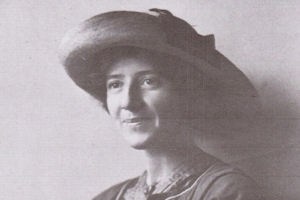Symposium on the Enigma of Marie Stopes
12 Apr 2016
Taking place on 23 June here at the University

In 1904 Marie Carmichael Stopes, the youngest DSc in the country, was the first woman to be appointed to the Science Faculty at the University of Manchester. We can view the syllabus she created and specimens collected by her. However, it was not her research in palaeontology that caused controversy but rather her position as a sexual revolutionary. After her first marriage was annulled she explored women's sexual relations in marriage and their right to control their fertility. Marie pioneered the formation of birth control clinics in working class areas. This was regarded by militant suffragettes, such as Lady Constance Lytton, as a continuation of their struggle.
Throughout her life Marie courted controversy and it is sometimes difficult to disentangle fact from the fiction that she created about herself. This international Symposium draws together leading experts from a variety of different disciplines to investigate 'the real Marie Stopes'. In the last decade there has been much original research. We are privileged to have as a speaker one of the few remaining people who knew Marie personally .
The Symposium will also explore controversial issues, such as Marie's membership of the Eugenics Society and why she wrote to Hitler.
Distinguished speakers
A personal view
- Dr Mary Stopes-Roe, Marie's daughter-in-law in conversation
Key note speaker
- Dr Stephanie Green, Griffith University , Australia: ‘Charlotte, Henry and Marie Stopes’ .
Confirmed speakers
- Dr David Gelsthorpe, University of Manchester Museum.' Marie the palaeontologist .'
Lunch and an opportunity to view Marie’s collection of specimens and a selection of her published material and family photographs.
- Dr Clare Debenham, University of Manchester. 'Marie as birth control pioneer'.
- Dr Lesley Hall, Emeritus Wellcome Library Research Fellow
Round table discussion. Featuring all participants and audience
Extra Enrichment – British Film Institute Archive on Marie Stopes:
a) Maisie’s Marriage; b) Marie Stopes’ Family Films
The Symposium is open to both academics and members of the general public. It is free but advance booking is essential as places are limited.
Booking
Email your postal address and number of tickets required to:
